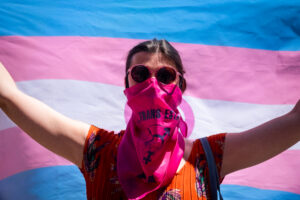“I used to be a woman, and I really am a feminist.” With his full beard, bald head and inked, muscular forearms, Buck Angel cuts a striking figure. The trans porn star is an unlikely feminist ally. We shouldn’t really get on.
I’ve been campaigning to end the porn industry all my adult life, while Buck has made his living in the porn industry. I don’t accept “transsexuality” as a diagnosis, while Buck is a walking, talking advertisement for it. But he has taken a liking to me, and the feeling is mutual.
The founder of Buck Angel Entertainment, winner of an array of porn awards, and the first transgender man to feature in an all-male porn film, Buck now uses his fame and platform to advocate for sexual freedom. He also speaks out against both the misogyny directed at women who dare critique trans ideology and the use of puberty blockers on children. Like me, he has been labelled a transphobe. And like me, people are constantly trying to silence him.
As you might expect, Buck, now 60, has lived an turbulent life: drug addict, porn star, prostitute. He marvels that he has made it this far. His childhood, though, was a “happy, really normal middle-class” one in LA. He was fortunate to have “incredible” parents who were completely accepting of his “ultra-masculine identity” as he was growing up. He looked like a boy, he dressed like a boy, he played tough and was always in fights. “My parents and pretty much all my family and friends called me the boy name, the name I felt close to. Not the girl name,” he remembers. “In the Seventies, a girl who wore boy clothes was really no big deal.”
But it was a big deal to be a lesbian. And things weren’t so easy at high school, where he presented as a very masculine woman who found refuge in sports. He knew “things just weren’t aligned for me and I just didn’t fit in. I knew I was attracted to women, but it was the Seventies, and we didn’t talk about that”. A straight-F student who liked to sleep in class, Buck focused on running, where he excelled — and would even beat the boys. He won sponsorship from Adidas and Nike, and there was even talk of training for the Olympics. “But in my private life I was struggling because I didn’t know how to be attracted to girls without being called a lesbian. And our coach said that if any of us ever became lesbians, he would never coach us again… We would do secret things [at] hotels. But… it was always like, don’t say anything because we’ll lose our sponsor”.
He was bullied and ostracised and struggled to deal with his sexuality and identity. The homophobia in the sports world was crushing, so he turned to drink and drugs. “This was 32 years ago, before [easy access to] the internet,” he says. Googling “sex change” wasn’t an option. “I just knew I felt like a man”, but he was unable to do anything about it.
But why not just live happily as a butch lesbian? “I wished I could,” he replies. To this day, I still think, “could I have done that?” In fact, I think of it more today than I ever have with all the new stuff that’s happening and the way they’re pushing kids to transition. But something inside of me said: ‘I have to be a man.’”
It was after he was spotted by a modelling agency that things started going massively downhill: it was an industry in which he was forced to be incredibly feminine, and was judged for what he looked like. He fell into prostitution, and the drug-taking spiralled. Hitting rock bottom, he had to finally admit he could not live as a woman and started to look around for someone who might be able to help him.
In 1990, Buck did find a willing therapist, and two years later took his first dose of testosterone. He was one of the earliest trans men to be prescribed hormonal treatment. He was, as his therapist said, a “guinea pig”. The technology wasn’t around for him to undergo genital surgery, however, so while he had his breasts removed, he chose to retain his vagina. “Back in the day they called transsexual porn “chicks with dicks”. I was like, oh dude, I can be a man with a pussy. I wanted to change attitudes, to show people what difference really was, and how we should celebrate and not hide from it.”
“I am proud that I have reclaimed the words ‘vagina’ and ‘pussy’ for transgender men’s use,” says Buck. “And I’m so grateful I don’t have the bottom surgery. I celebrate my vagina and I don’t feel any less male.”
But if he’s anti-misogyny, as he insists, how does he justify the fact that he made his name and a living from a business that commodifies and demeans females? This is an industry that causes direct harm to vulnerable women, as well as giving boys and men permission to act upon rape fantasies.
There is value in celebrating “diverse sexual experience”, he tells me. Though he does admit there can be “some sick, nasty stuff that happens and anyone who denies that it happens in our industry is not doing us a service”. Buck no longer makes porn, so perhaps it is easy for him to dodge responsibility, but I’m not exactly satisfied with his half-defence of his industry. Can a feminist really be a porn performer and defender given the harms it causes, which worsen by the day with the help of social media? “I will always admit there’s a very deep, dark side to porn,” he says.
He was often treated badly by mainstream pornographers, but says he pushed through until “I started to be on some level celebrated and people started writing to me, not only trans men: thank you for doing this”. And it was a message that could have resonance beyond the porn industry.
The trouble is, Buck is outspoken and unorthodox and many in the transgender community don’t like that. And he was hated for not having full surgery. He and I both acknowledge how things have changed when it comes to trans activism. The “trans men are men”, “trans women are women” mantras have led to a total denial in some quarters that there is any physical difference involved.
“Back in the day, we never denied our biology,” says Buck. “But I believe our community was hijacked by powerful, wealthy trans women. They have a lot of influence, and I think they’re envious of women. I know this will cause anger and hurt feelings, but I am not here to protect feelings or to hide the truth.” He’s right. In the US and the UK, it is the activists with the most clout, with the money and power, whose voices get elevated. Buck is wary of modern-day trans rights activists. “They’re making us look like fools. It’s disgusting. A lot of it is misogyny — writing out women.”
Then, in 2021, Buck was a signatory to a public statement “Trans Men Fight Back” outlining concerns that “autogynephilic trans women” were “controlling the narrative” on trans issues and had taken a “troubling turn”. The authors pointed to the framing of counselling for gender dysphoric children as “conversion therapy”. They also protested the “erasure of women’s spaces, and women’s language”.
The response was swift and brutal, and Buck was singled out for attack. The open letter in response to his statement was signed by 280 trans activists who cited “transmisogyny, transmedicalism, and mockery of nonbinary identities”. The trans community was urged to target him by “not selling his merchandise, not inviting him to speak at their conferences or on their podcasts, not collaborating with him on videos or essays, until such a time as he has made a full, public apology acknowledging the harm he has caused to trans people by repeatedly spreading false scientific claims”.
Shunned and maligned by the very community he helped to build, Buck struggled to cope. “It hurts,” says Buck, obviously still upset. “I have done a lot of work for the trans community for many years, as I did when I was in the lesbian community. It’s always been very dear to my heart. So, it hurts when a bunch of young people who probably aren’t even trans rake me over the coals.”
His business selling sex toys and clothing merchandise suffered, as did his advocacy, and the hostility took its toll. “But then I was like: ‘OK, you want to play that game with me?’ And it lit a fire under my ass. On some level that made me want to be here today with you, to try and build bridges. I knew [trans activists] were hijacking and appropriating our community.
“I’ve been a homeless crack addict, but today I got a roof over my head. I got a beautiful partner and a kid. I am not fearful of any of those people because they’re not part of this community. I will not capitulate.”
This is true. While he is deeply sympathetic with all trans people, he will not be deterred from supporting and engaging with those young people who are detransitioning even though this means he is constantly being labelled “anti-trans”. The attacks only stiffen his resolve. In particular, he is hated within a certain section of the community for, unusually, being against puberty blockers for children: “I believe it is dangerous,” he says. Buck didn’t take HRT until his late 20s. In return he’s been accused of causing serious harm to “trans kids” for being dead set against medical intervention for kids.
“Gender dysphoria is a mental disorder,” he explains to me. “It’s in your brain, not in your body. I don’t want these kids to transition unless they really, really need to do it.”
“Those kids who regretted transitioning got hurt because of our stupid community, and so I’m going to take responsibility for them,” he continues. “I am a part of the trans community, and I feel it is my duty to support them. Affirming a child’s trans identity without questioning it is ultimately harmful,” says Buck. “They need therapy way before they even think about going down this road.”
As far as Buck is concerned, there is a new movement inside a community he once felt such a part of. “An evil force is taking over a space that has saved lives for a very long time. I use this term evil force because it feels as though something has consumed the ability for a healthy dialogue among a diversity of voices, which make up our community.”
He agrees with me that the modern-day trans movement is motivated by misogyny. “It is so disturbing to see from my vantage point. The bully behaviour is to force women to shut up if they do not confirm that ‘a trans woman is a woman’. The actual physical violence at women’s events by TRAs has nothing to do with trans rights and everything to do with hate towards women.” As he sees it: “If they don’t want to be called men, they should stop acting like men. Since when do women act like insane weirdos punching women in the face?”
I like Buck, and appreciate both his frankness, and his support against the bullying and misogyny of extreme trans activism. But we are worlds apart when it comes to pornography and his firm belief in the notion of being “trapped in the wrong body”. Nevertheless, it is crying shame that someone as interesting as Buck Angel, and with so much of value to add to the debate has been cancelled by his own community.
He is, though, keener than ever to speak out against violent trans activists who target women for defending our rights.
“I live happily as a man,” Buck tells me as we say goodbye, “but I will never, ever turn my back on women.”
Disclaimer
Some of the posts we share are controversial and we do not necessarily agree with them in the whole extend. Sometimes we agree with the content or part of it but we do not agree with the narration or language. Nevertheless we find them somehow interesting, valuable and/or informative or we share them, because we strongly believe in freedom of speech, free press and journalism. We strongly encourage you to have a critical approach to all the content, do your own research and analysis to build your own opinion.
We would be glad to have your feedback.
Source: UnHerd Read the original article here: https://unherd.com/





